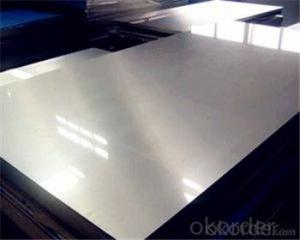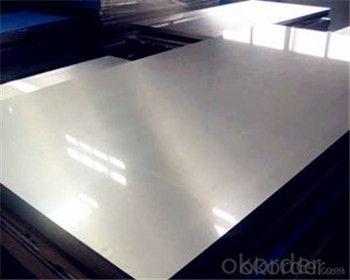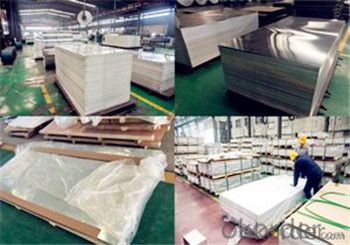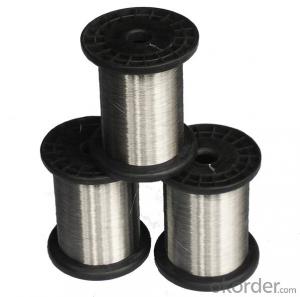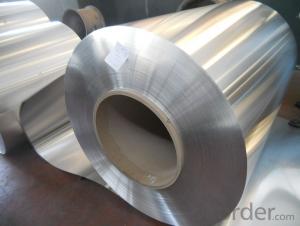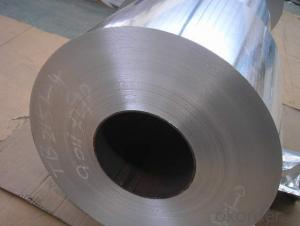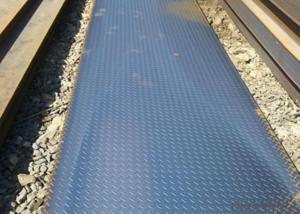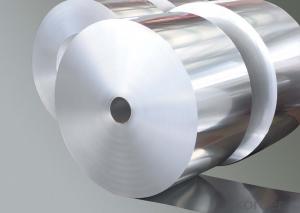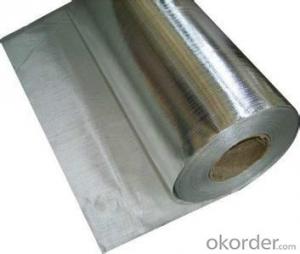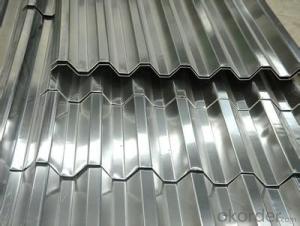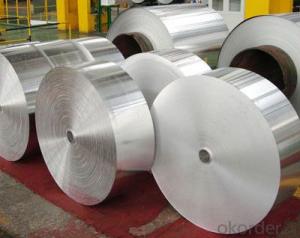Foldable High Quality Aluminum Sheets with a Good Price
- Loading Port:
- Qingdao
- Payment Terms:
- TT OR LC
- Min Order Qty:
- 10000 kg
- Supply Capability:
- 100000 kg/month
OKorder Service Pledge
OKorder Financial Service
You Might Also Like
Specification
Aluminum Sheet
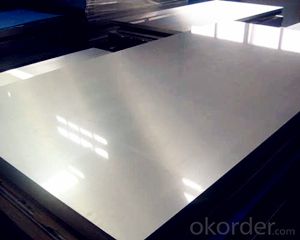
Product Description of Aluminum Sheet
When aluminum is passed between rolls under pressure, it reaches the desired thickness or gage to form aluminum sheet. When the rolling process is stopped largely determines whether the final product will be aluminum plate (thickness 0.2-500mm, width 200mm or more, length 16m or less), aluminum strip (width 200mm or less), or aluminum foil (width 0.2mm or less).With the improvement of Production equipment, the thickness of aluminum sheet can be 600mm or more.
Classification of Aluminum Sheet
By alloy composition, aluminum sheet can be divided into:
High purity aluminum plate rolling (by the content above 99.9 high purity aluminum)
Pure aluminum plate (ingredients made from pure aluminum rolling)
Aluminum alloy (composed of aluminum alloy and auxiliary, usually with aluminum and copper, aluminum, manganese, aluminum, silicon, aluminum, magnesium, etc)
Compound aluminum brazing plate (through a variety of means of material compound special use aluminum material)
Clad aluminum (aluminum coated aluminum sheet used for special purposes)
According to the thickness of the different can be divided into thin plate and thick plate. GB/T3880-2006 standard stipulated in the thickness of 0.2 mm the following referred to as the aluminum foil.
Application of Aluminum Sheet
1, illumination lighting
2, solar reflection
3, architectural appearance
4, indoor decoration, ceiling, metope, etc
5, furniture and cabinets
6, signs, nameplate, cases, bags
7, Indoor decorations, such as picture frames
8, household appliances: refrigerators, microwave ovens, audio equipment, etc
9, machine parts
10, mold manufacturing
11, chemical, thermal insulation pipe coating
Technical Parameters of Aluminum Sheet
| Alloy No. | Temper | Thickness(mm) | Width(mm) | Length(mm) | Inner Diameter (mm) | Main Product |
| 1050 1060 1100 3003 8011 | 0 H12H14 H16 H18 H22H24 H26 | 0.2-4.0 | 600-1400 | 900-4200 | Ф75 Ф150 Ф205 Ф305 Ф405 Ф505 | Pure aluminum , aluminum alloy plates, wall plates, color-coated, roll, ceilings and other aluminum products |
ntroduction of our company
Our company is a professional Aluminium Strip manufacturer and Aluminum Circles manufacturers,mainly supply Aluminium Coil,Aluminum Circles,Aluminium discs,Aluminum Sheet,Aluminum Strip, Household Aluminum Foil,Aluminum Foil for Pharmaceutical Packaging,Aluminum Foil Tape,Aluminum Foil for Air Conditioner,Aluminum Foil for Container etc. series of aluminum products, sincerely welcome everyone to visit.
- Q: This question asks for methods to prevent rusting on aluminum sheets during the installation process.
- <p>To prevent rusting on aluminum sheets during installation, ensure that the aluminum is of high quality and free from impurities. Keep the surface clean and dry at all times, avoiding contact with corrosive materials. Use appropriate protective coatings or sealants that are compatible with aluminum. Avoid scratches or dents that can expose the metal to moisture. Store aluminum sheets in a dry place before installation. During installation, handle the sheets carefully to avoid damage. Regularly inspect and maintain the aluminum sheets to catch any signs of corrosion early.</p>
- Q: how to find 0.6mm waste strake of aluminum sheet?
- ask door and window maker for some strake.
- Q: How does the surface treatment of aluminum sheet affect its appearance?
- The appearance of aluminum sheet is greatly influenced by its surface treatment. Natural aluminum has a shiny and reflective surface, which can be improved or modified through different surface treatments. One popular surface treatment for aluminum sheet is anodizing, which involves the creation of a protective oxide layer on the surface through an electrochemical process. This treatment offers a wide range of colors and finishes, ranging from vibrant and opaque to translucent and metallic. Anodized aluminum sheets have a sleek and modern look, making them commonly used in architectural and decorative applications. Another option for surface treatment is painting or powder coating. These processes involve applying a layer of paint or powder onto the surface of the aluminum sheet. This treatment allows for customization in terms of color, texture, and finish. Painted or powder-coated aluminum sheets can have a smooth and glossy appearance or a textured and matte finish, depending on the desired outcome. This treatment is frequently utilized in industries like automotive, aerospace, and construction, where aesthetics and durability are important. Additionally, aluminum sheets can undergo mechanical surface treatments like brushing or polishing. Brushing involves creating parallel lines on the sheet's surface using abrasive pads, resulting in a brushed or satin finish. This treatment gives aluminum sheets a contemporary and industrial look. On the other hand, polishing involves buffing the surface to a high gloss and mirror-like finish. This treatment is often used for decorative purposes, such as in the production of jewelry or household items. In conclusion, the surface treatment of aluminum sheet plays a crucial role in determining its appearance. Whether it is anodizing, painting, powder coating, brushing, or polishing, each treatment offers a distinct visual effect that can enhance the aesthetic appeal of the aluminum sheet for specific applications and industries.
- Q: This question asks for methods to protect aluminum sheets from damage during the installation process.
- <p>To prevent damage to your aluminum sheets during installation, follow these steps: Use protective gloves to avoid scratches from hand contact. Handle the sheets with care, especially at the edges and corners. Keep the surface clean and dry to prevent any dirt or moisture that could cause damage. Use appropriate tools designed for aluminum to avoid marring the surface. Ensure the installation site is free from debris that could cause scratches or dents. Install the sheets in a controlled environment to avoid exposure to harsh weather conditions. Finally, consider using a protective film or cover on the aluminum sheets until they are fully installed.</p>
- Q: Are the aluminum sheets suitable for architectural applications?
- Yes, aluminum sheets are highly suitable for architectural applications. Aluminum is a versatile material that offers numerous benefits for architectural projects. It is lightweight, durable, and resistant to corrosion, making it ideal for exterior applications. Aluminum sheets can be easily shaped, formed, and manipulated to create intricate designs and structures, allowing architects to bring their creative visions to life. Additionally, aluminum is a sustainable material as it is 100% recyclable, reducing the environmental impact of architectural projects. Overall, the use of aluminum sheets in architectural applications provides both aesthetic appeal and functional durability, making it a preferred choice for architects and designers.
- Q: This question asks for a list of the various types of profiles that can be made from aluminum sheets.
- <p>Aluminum sheet profiles come in a variety of types, suitable for different applications. Some common types include: 1. Flat Sheets: These are simple, flat aluminum sheets with no bends or curves. 2. Corrugated Sheets: These have a wavy or ridged pattern, providing strength while allowing flexibility. 3. Perforated Sheets: These have holes punched in a regular pattern, useful for ventilation or decorative purposes. 4. Embossed Sheets: These have a raised pattern on the surface, often used for aesthetic or functional reasons. 5. Extruded Profiles: These are complex shapes created by pushing aluminum through a die, suitable for structural applications. 6. Expanded Metal Sheets: These have a diamond-shaped pattern, providing strength and rigidity. 7. Checkered Plates: These have a raised, non-slip pattern, often used for flooring. Each type has its own specific uses and properties, and the choice depends on the requirements of the project.</p>
- Q: This question asks for a list of various types of aluminum profiles that are typically used in conjunction with aluminum sheets.
- <p>Aluminum profiles are extruded shapes commonly used with aluminum sheets for various applications. The different types include: 1. Angle profiles, which are used for corners and edges. 2. Channel profiles, suitable for creating channels or frames. 3. T-slot profiles, ideal for modular systems requiring adjustable components. 4. U-channel profiles, used for covering edges and creating frames. 5. H-profiles, often used in structural applications. 6. Flat bar profiles, used for simple straight edges. 7. Round and square tube profiles, used for structural support and design elements. 8. Special profiles, which are custom-made for specific applications. These profiles are chosen based on the structural needs and design requirements of the project.</p>
- Q: Are 101 aluminum sheets suitable for heat sinks?
- Yes, 101 aluminum sheets are suitable for heat sinks.
- Q: What are the aluminum plates for?
- Is the aluminum plate with a thickness of more than 0.2mm to 500mm, 200mm width, length less than 16m aluminum material called aluminum plate or aluminum sheet, aluminum is below 0.2mm, 200mm within the width of the row material or bar (of course, with the progress of the large equipment, the width can be 600mm row material also more). Aluminum sheet refers to the rectangular plate made of aluminium ingot rolled and divided into pure aluminum plate, alloy aluminum plate, thin aluminum plate, middle thick aluminum plate and pattern aluminum plate. Aluminum plate is widely used in construction, packaging, air conditioning, refrigerators, solar energy, cosmetics and other industries, but also can be used in power plants, chemical plants, petrochemical plants, anti-corrosion, insulation and so on.
- Q: Can aluminum sheets be anodized for added durability?
- Yes, aluminum sheets can be anodized for added durability. Anodizing is an electrochemical process that forms a protective oxide layer on the surface of aluminum, increasing its corrosion resistance, hardness, and overall durability.
Send your message to us
Foldable High Quality Aluminum Sheets with a Good Price
- Loading Port:
- Qingdao
- Payment Terms:
- TT OR LC
- Min Order Qty:
- 10000 kg
- Supply Capability:
- 100000 kg/month
OKorder Service Pledge
OKorder Financial Service
Similar products
Hot products
Hot Searches
Related keywords
